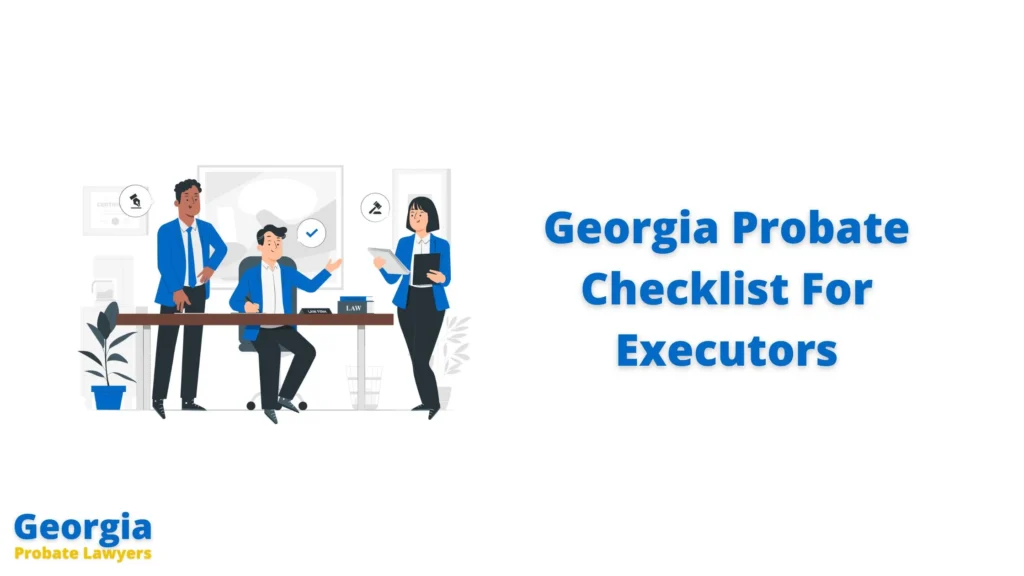
If you’ve been named the executor of an estate in Georgia, you might feel unsure about where to start.
This Georgia Probate Checklist simplifies the process with a clear, step-by-step probate checklist.
You’ll learn exactly what to do, from filing the will to distributing assets.
We’ll also cover common challenges and how to avoid delays.
By the end, you’ll have everything you need to navigate probate confidently.
Avoid the delays, expenses, and public exposure of probate.
Schedule your free, no-pressure Estate Planning Roadmap Call today.
"*" indicates required fields
Probate is the legal process used to settle someone’s estate after they pass away.
It involves paying off debts, distributing assets, and ensuring the will (if there is one) is followed.
In Georgia, the probate court oversees this process to ensure fairness and compliance with the law.
If the deceased didn’t leave a will, Georgia’s intestacy laws decide how assets are divided.
That’s why having a clear understanding of probate is essential for executors.
Here is a step-by-step Georgia probate checklist.
Your first task as executor is to find the deceased’s original will.
This document outlines their wishes and names you as the executor.
Why It’s Important: Without the will, the court will rely on Georgia’s laws to decide how to distribute assets, which may not align with the deceased’s wishes.
What to Do:
Once you’ve located the will, file it with the probate court in the county where the deceased lived.
This step formally opens the probate process.
Why It’s Crucial: Filing the will validates it and gives you the legal authority to act as executor.
What You’ll Need:
Tip: Double-check all information on the petition to avoid unnecessary delays.
If you fill it out wrong, the courts will send it back to you.
You have to inform all beneficiaries listed in the will and any heirs about the probate process.
(Even those not named in the will.)
Why This Step Matters: Keeping everyone informed prevents disputes and ensures transparency.
How to Notify:
Make a complete list of the deceased’s assets, including:
Why It’s Important: The inventory shows the value of the estate.
And it ensures you account for everything during the probate process.
Steps to Follow:
Before distributing assets, you must pay any debts and taxes owed by the estate.
Why It’s Critical: Failing to settle debts can result in creditors pursuing claims against the estate later.
What to Do:
Tip: Keep all receipts and proof of payment for your final accounting report.
Disputes over the will or the estate can arise during probate.
These can include challenges to the will’s validity or disagreements about asset distribution.
Why It’s Important to Prepare: Handling disputes quickly prevents delays and ensures the estate is managed fairly.
How to Manage Disputes:
Consult a probate attorney if conflicts escalate.
Once debts and taxes are resolved, distribute the remaining assets to the beneficiaries as outlined in the will.
Why It’s the Final Step: Distributing assets closes the probate process and fulfills your responsibilities as executor.
How to Do It:
To officially close the estate, you’ll need to file a final accounting with the probate court.
Why It’s Required: This document ensures the court that you handled the estate properly.
What to Include:
Tip: Review your records carefully before submitting the final report to avoid any issues.
Even with a checklist, executors can run into problems.
Here are some common challenges and how to handle them:
Are you overwhelmed trying to figure out the probate process in Georgia?
Our Georgia probate attorneys handle everything for you.
We specialize in taking as much as possible off your plate so that you are not:
Fill out the form to take this off your plate.
Avoid the delays, expenses, and public exposure of probate.
Schedule your free, no-pressure Estate Planning Roadmap Call today.
"*" indicates required fields
Our Georgia probate lawyers work remotely, so you don’t have to visit an office. Here are all the counties we serve in Georgia.